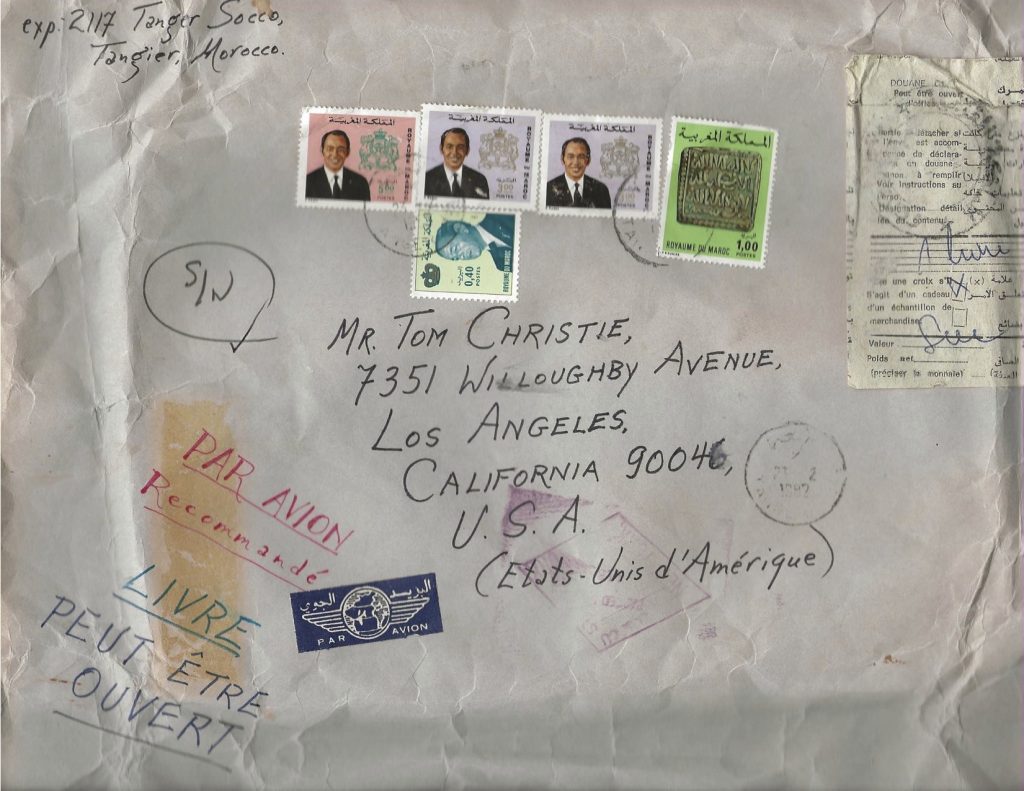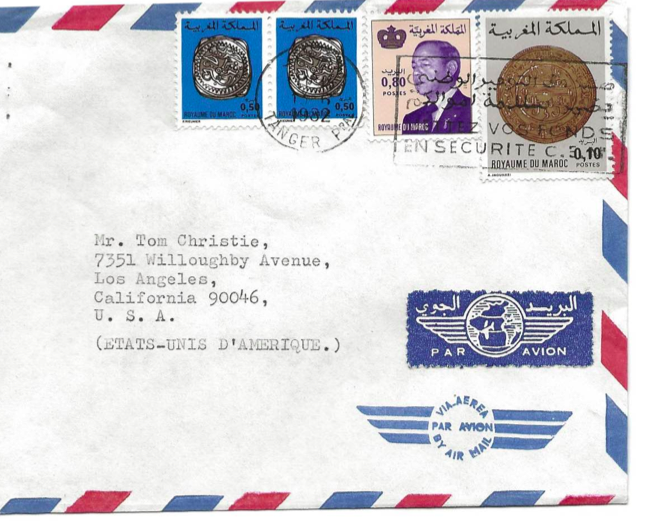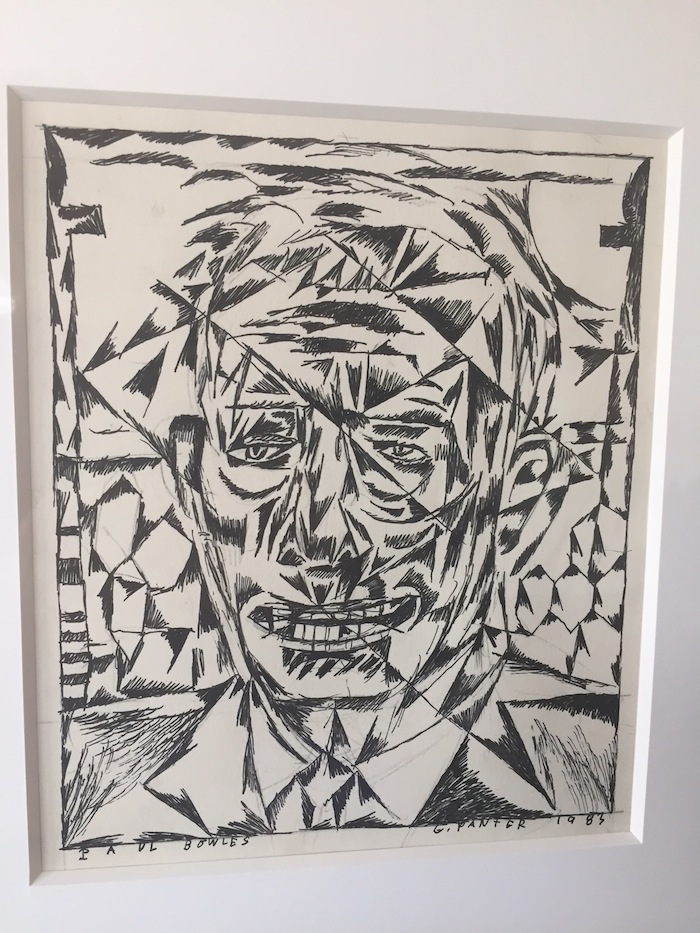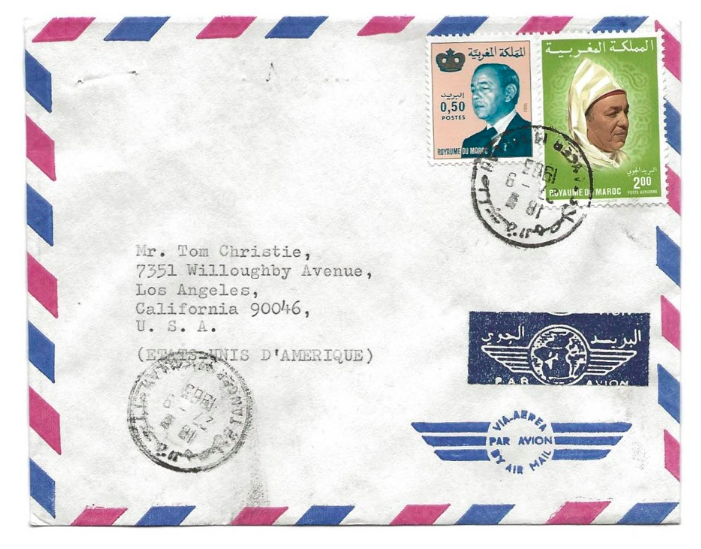¤

2117 Tanger Socco,
Tangier, Morocco.
1/v/81
Mr. Christie:
This film-script business goes on and on, and no films are ever made. Fortunately [Robert] Aldrich and Twentieth-Century and Universal bought and paid for the film rights to three novels long ago, or inflation would have made mincemeat of me instead of merely making life difficult. I’ve come to believe that my works will never be filmed; it doesn’t dismay me too much.
I just finished writing to some people who sent me a filmscript which combines the characters and situations of three different stories of mine: The Delicate Prey, Pages from Cold Point and A Distant Episode. Hard to believe. I assume they decided that three stories cut up and thrown into the stew would be better than one. But people are constantly doing this sort of thing. Thus, your suggestion comes as a return to order after being confronted with chaos.
I’ve always thought The Hours After Noon amenable to film treatment. Certain material is, and other material isn’t. (Losey might conceivably be interested; he’s an old friend of mine from the ‘thirties.) Anyway, all my best.
Paul Bowles
¤
1/x/81
Dear Mr. Christie:
I have read your script of The Hours After Noon through twice, and made a few notes which I’ll list in this missive. If I were able to judge its worth from reading it, I should be able to write my own scripts. All I can say is that, like any other author, I was pleased to see how closely it followed the original material. And I’m certain you didn’t expect me to offer professional suggestions.
I should be delighted to see you here and discuss the script with you, if you and your wife visit Tangier. You could even examine the estate at the top of the cliffs where the pension scenes could all be shot. (It seems to me that there should be a lot of sea and wind sounds throughout; they form the background music of the piece.) But we can save such considerations until they can be discussed in person, once you are here, which I hope you will be. I hope the project can be brought to fruition.
Sincerely, Paul Bowles
¤
24/xi/81
Dear Tom Christie:
I’m sorry the Consulate has orders not to divulge anyone’s address. In my case it seems particularly absurd, since I live directly across from the Consulate. A messenger just brought me your note.
My address is: Immeuble Itesa, Calle Campoamor, and my flat is No. 20, top floor. I’m at home every day after half past five in the afternoon, and should be delighted to see you and Mrs. Christie as soon as you can comfortably get here. that is to say, beginning today, Tuesday.
So I hope to see you soon.
all best,
Paul Bowles
¤
5/ii/82
Dear Tom Christie:
I received a notice from the customs office yesterday. Calling at that detestable place, I found a copy of MIDNIGHT MASS from you. [1] One day when I feel particularly energetic, I’ll take the book down there and post it back to you. The energy is necessary because the customs people, considering that the mailing of any reading matter to a foreign country is tantamount to subversion, make it all as difficult as they can. The idea here is, of course, to discourage undesirable foreigners from remaining. (Non-Moslem foreigners are by definition undesirable.) They have many ways, some subtle, some not, of trying to persuade one that it would be better to go elsewhere; but of course one must pay no attention to any of it.
You’re partially right about the way I write the stories. Not at one sitting, (although I have done that in the past) but at least without rewriting. By the time I start to put the words on paper I know enough to be able to continue without reflecting. A few years ago I was sufficiently rash to begin to rewrite a story; by the time I’d finished, I’d written innumerable versions of it. (Reminders of Bouselham.) Never again. (I’ve never rewritten any part of a novel, either, although I was asked to add an entire chapter to The Spider’s House by Random, and did, even if à contre coeur.)
All my best to you and Mrs. Christie.
Paul Bowles
¤
16/v/82
Dear Tom Christie:
A note to say that you must not have received my previous letter, written at the time I wrote my agent regarding the option. That doesn’t surprise me at all, since approximately a third of all correspondence is going astray this spring. Even my federal income-tax returns disappeared en route to New York, so that I’ve had to send everything again, and will be late in getting checks to them. And the corrections to the page proofs of a new volume never arrived in London, with the result that the publication of the book has had to be postponed from May to August. The postal employees have all been fired, and new personnel installed, but that doesn’t seem to help matters at all. One great trouble is that they can’t read Roman characters, so that it’s hard for them to know what country is indicated on the envelope. Besides that, the postal rates have been increased recently, but no one, no one, knows what the new rates are. All these things make for terrible bottlenecks throughout. […]
Since this may not reach you, there’s no point in continuing it.
all best to you both.
Paul Bowles
¤

12/vi/82
Dear Tom Christie:
Thank you for your letter of May twenty-seventh. (I was about to say: I’m glad the mails are functioning again. But there’s no reason to expect that because one or two letters get through, others will do likewise. The only thing one can count on here is the certainty that nothing will be what one expects it to be.)
I take it you’re intending to rewrite the Hours script. As for a script of [Frozen] Fields, your mention of it was the first I’d heard. From what you say, I assume you think of it as TV fare. (I don’t know what PBS stands for, therefore it must have something to do with television. Whenever something goes completely over my head, I can be almost certain that it’s connected with television, which apparently is the chief entertainment now in the United States — moreso than cinema, which is hard to conceive.)
I don’t see anything in common between Graham Greene and me. It’s a flattering comparison, since I think of him as today’s foremost novelist. No, he’s an excellent novelist, and I’m certainly am not even a second-rate one, or, it would be more exact to say, not a novelist at all, much as I should have liked to be one. But I function better in the story form.
My best to Clare and you.
Paul B.
¤
26/viii/82
Dear Tom Christie:
One more letter gone astray. […] It’s a mistaken assumption that [agent Ned] Leavitt keeps me informed. I don’t even know who has paid what or what is published.
I did mention Madame Solario; it’s beautifully imagined and written. I think you’ll appreciate it. What a shame that the author never wrote anything else! And didn’t even dare sign her name to it for fear of scandalizing her British in-laws. (She was American, of course!)
My summer classes are over and the students are dispersed. Now I have a certain amount of time to spend on my own affairs.
Dios sabe if this note will actually reach you. I hope it does.
all best,
Paul B.
¤
2/xi/82
Dear Tom Christie:
Your letter has been here for three weeks, but once again I’ve allowed my letter-writing to slide because I’m working — that is, writing. When that begins, I let everything else wait. It doesn’t happen often, so I must take advantage of the blessing while it lasts.
I have the information about the author of Madame Solario in a letter somewhere. I believe her name was Rainey, and she was American. Her daughter is (or was last year) still alive and it was she who supplied my informant with the details. The author married an Englishman whose family would have deplored having a writer as a relative — apparently they considered it extremely ill-bred for a lady to scribble her thoughts and then publish them. Thus when she completed Solario she was more or less obliged to have it appear anonymously. It was a great shame, for she clearly could have written other novels. She was entirely professional; I wish we had a novelist as good writing now!
This year I had twenty-four students. They continue to send manuscripts to me, and I confess I’m slow in responding: there are too many, and in any case I feel that once classes are finished my work is over. Clearly they don’t feel that way.
all best,
Paul B.
¤
2/i/83
Dear Tom Christie:
Yours of December ninth before me.
Yes, I’ve noticed that younger people are generally poor correspondents. They haven’t read enough, so they have difficulty putting their thoughts into words and transferring them to the paper. Television once again.
Anent your projected (or who knows? — perhaps completed) article on my work, I’m not acquainted with the remarks made by the men you mention: Lehan, Hassan and Eisinger. It seems to me that the editor of Commentary did a good piece some years ago. Also Wendy Lesser; her piece has been reprinted in the current issue of Contemporary American Fiction, I believe it’s called. Apparently there’s a selection of critical material on my work, along with that of somebody else, in the issue. I haven’t seen it, so I can’t comment on it. What annoys me in most critics is their penchant for paying all their attention to the subject-matter, and none to the writing itself. If they were more aware of the writing, it wouldn’t be necessary for them to ponder on the meaning of the subject-matter. The method in the writing would offer the explanation of why the tale took the course it took. But that would involve more than a cursory reading on their part, and one doesn’t expect that. I’d say offhand that of all contemporary writers I’m he whose work requires the least explanation. It’s all there on the page; no tricks. It means just what it says, and no more; why must it be assumed to mean more than it says? To me, meaning has to do with the flavor that remains after one has finished reading a book and meditated upon it for a certain length of time; it’s thus a subjective thing.
Best for 1983.
Paul Bowles
¤
9/ii/83
Dear Tom Christie:
I’ll try to get the difficult question out of the way first. Yes, I assume that most of what I write will have more than one “level of meaning,” but I also assume that I needn’t be conscious of the meanings, that if I have written carefully they will be there for anyone disposed to be conscious of them. As you know, two pages a day was generally my average, each page taking a long time, not to write, but to compose before and during the putting of words on paper.
Your letter went to Costa Rica, and is stamped 31 Enero; I thought that interesting, not seeing how that country could conceivably be on the way from California to Morocco. Perhaps by now it is, since the world is changing its shape rapidly.
Symbols? I’m against them most of the time because they tend toward abstraction and the cutting of knots instead of their untying. If they’re obvious they’re uncouth, and they’re usually made obvious for fear the reader won’t notice them. If they’re hidden, rather than displayed, the result is superior, whether or not the reader becomes aware of their presence. A subliminal influence, one might say.
If you’re writing music for the theatre, clearly you’re doing it in order to be paid for it. But once you’ve signed the contract you never think of money again; you think only of solving the collaborative problems in your own terms and of enhancing the production as much as you can. But I didn’t take on whatever job was offered me, although I did agree to work on certain productions which were doomed from the start, in order to get money. You can compromise with everything except the quality of your work, it seems to me.
This isn’t a letter; it’s a series of comments on sections of yours.
all best,
Paul B.
¤
17/iii/83
Dear Tom Christie:
There was [no] need to feel trepidation about sending the critical piece; I thought it very good. In the first place, it was carefully documented, and free of factual errors; do you know how rare that is? To go on, I don’t think you were so influenced by the critical works you read (good and bad — the majority bad) that you didn’t do your own thinking and come to your own conclusions. I liked the four interstitial comments, although I wonder where you found the first, second and third. I don’t think they’re part of any book. Felicitations!
Now you must explain the final paragraph, [2] which as you can imagine, is in code as far as I’m concerned. David Lynch? Jack Nance? Henry Spencer? Eraserhead? Chuck Heston I suppose is Charlton Heston, whose name I’ve heard but whom I’ve never seen on the screen. And by the netherworld I assume you mean Hell. Is that correct?
I liked the illustration [by Gary Panter]; I don’t know if I’d call it a portrait. If it’s taken from a photograph, the photo must have been made when I was considerably younger, but that’s all right, because most of the material you deal with dates from roughly three decades ago.
Anyway, thanks very much and all my best,
Paul B.

¤
14/v/83
Dear Tom Christie:
Thanks for your elucidations concerning Eraserhead etc. It all sounds properly grotesque.
My first reaction to your film project is negative. I don’t see the point of mixing fiction with “interwoven” shots of the author. It seems clear that no dramatic tension could be achieved, or if it were, it would soon be interrupted by what I, at least as viewer, would welcome about as much as a commercial on tv. The idea is novel but I should think with good reason. Companion pieces I can understand. A mélange of fact and fiction strikes me as fashionable but not workable.
A filmed interview would be possible, naturally, although I’m skeptical of its interest, mainly because I’m not an impressive person and am not particularly inclined to be forthcoming in conversation. It always seems to me that my interviews make sense only after I’ve rewritten them and made them clear. Unfortunately one can’t very well do that in the medium of film.
I’d be happy to see you, but how do I know if I’d be worth filming?
In any case, I’ll expect to hear from you.
all my best,
Paul Bowles
¤

21/vi/83
Dear Tom Christie:
There’s very little to say, save that I’m in receipt of your missive of June eleventh, and that we’re having an early summer.
My students will arrive next week, thus effectively isolating me from my normal life with its letter-writing. It seemed to me last summer that I scarcely had time to eat, what with the manuscripts I had to read. May they bring only short stories this year, and not four-hundred-page novels!
[DEL TILL END???] With regard to your idea for a triptych: would the principal character of each part be portraying the same individual at different stages of his life? I ask because you mention that the same actor would be used for the two sections in which the main protagonist is an adult. Somehow I don’t believe you mean it this way. A Distant Episode in that context would clearly be a punishment for bad behavior in Call at Corazon. In any case, I hope Losey sees logic in the combination,
and that London gives you good weather.
all my best,
Paul Bowles
¤

10/ii/84
Dear Tom Christie:
You say that I write fairly regularly for Antaeus and other periodicals, but that’s a misconception. I don't write for any press. I merely write. When I have something finished I may or may not send it out immediately. I think about the various possible outlets for the piece, and send it where I think it should be published. But I’ve written no fiction since October 1982, and consequently have nothing to offer anyone. If I should write something that seems apropos, I’ll tell you. Thanks for thinking of it.
The Hours After Noon is now under option to somebody. It would be nice if they were actually to make it!
all best,
Paul Bowles
¤
12/iv/84
Dear Tom Christie:
No, I don’t see how any film can be explicitly about writing.
If a writer is going to read from his own works, he’d better do it on records or tape, for they have no accompanying visual image. Then the listener can have his eyes shut if he likes, in order to hear better. (Although, as you say, it isn’t generally worth listening to in any case. Joyce reading Anna Livia Plurabelle is a notable exception.) […]
It’s hard to pick out a Purdy novel which is better than other Purdy novels. No one of them is a model of perfection. The writing is often slipshod; sometimes I wonder if he reads them over before sending them out. I think one has to have read a lot of his books in order to appreciate his uniqueness. In the aggregate they form a very personal cosmos. This is not to say that I don’t regret the solecisms, but in the final analysis they become part of the style and one overlooks them. (I assume you’re reviewing On Glory’s Course.) As I wrote Gore [Vidal]: You have to learn to read what he means rather than what he writes. (This is not an attitude I’d adopt with a student, as I’m sure you’re aware.)
I loved your three Los Angeles bits of information. The Crack-Up! [3]
So anyway, spring seems to have arrived.
all best,
Paul B.
¤
9/ii/85
Dear Tom Christie:
I’m not certain whether I’ve replied to your letter of August 21, but I suspect that I haven’t. It was just at that time — early September — that I went to Switzerland, and when I returned I was ill for two months. So I imagine that your missive went unanswered, and I’ll pretend that it came last week.
You asked about my students. There haven’t been any since the summer of 1983: the School of Visual Arts abandoned its Tangier program in January 1984 after cancellations due to newspaper reports of riots in Morocco. (The New York Times played them up with exaggeration, and in general assumed a highly minatory tone in its articles, so naturally people reacted with dismay.)
William Burroughs was here for a short visit three weeks ago, and we talked and talked. (Memories of what life in Tangier was like three decades ago.)
Someone has arrived, and I must stop.
all best for 1985.
Paul B.
¤
Tom Christie is a writer in Los Angeles and Berlin.
¤
[1] So absurdly shy was I in Tangier that, although we spent two or three nights at Bowles’s apartment, during which time he showed us several books signed to him by William Burroughs, Jack Kerouac, and others, I never got up the nerve to ask if he’d sign a book for me. With that in mind, I returned to his flat on our last day there but failed to find him home. When I got back to Los Angeles, I mailed him a copy of Midnight Mass along with some return postage. Some time later I received it with the following inscription: “This book has already made the journey between California and Morocco four times. I hope its fifth passage will land it in your laps in good condition! My best wishes, Paul B. Tangier 22/II/82”
[2] “David Lynch once said, when asked why he had chosen Jack Nance for the role of Henry Spencer in Eraserhead: ‘Well, if you’re going into the netherworld, you don’t want to go in with Chuck Heston.’”
[3] From my letter to Bowles, March 8, 1984, “Orwell got it all wrong; people in the West will always be their own worst enemy. I offer three examples of rampant madness in Los Angeles: 1) The Inner Trip Center on Sunset Boulevard. 2) An advertisement in the Los Angeles Reader from one Bonnie B. Bynder, Reincarnation Counselor. 3) An advertisement in the L.A. Weekly paper: WOMEN’S ORGASM — Can be learned — 10 week class."
LARB Contributor
Tom Christie is a writer based in Los Angeles and Berlin.
LARB Staff Recommendations
William S. Burroughs and the Biosphere, 1974–1997
Kathelin Gray tells the strange tale of William S. Burroughs and the Biosphere.
Dangerous Undercurrents: Sailing the Open Ocean of the Female Psyche in “Catalina”
Holiday Reinhorn reviews Liska Jacobs's debut novel, "Catalina."
Did you know LARB is a reader-supported nonprofit?
LARB publishes daily without a paywall as part of our mission to make rigorous, incisive, and engaging writing on every aspect of literature, culture, and the arts freely accessible to the public. Help us continue this work with your tax-deductible donation today!
:quality(75)/https%3A%2F%2Fdev.lareviewofbooks.org%2Fwp-content%2Fuploads%2F2018%2F08%2FChristieBowles.png)